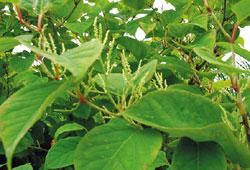- Tel:0086 29 89196049
- Mobi:+86 17342318735 +86 18089264518
- Add:Constellation 11107 Oak
- Technology 5th Road, Xi'an

Polygonum cuspidatum extract
Alias: Japanese Polygonum Polygonaceae Polygonum section::
The use of partial: rhizomes
Chemical composition: the product consists mainly of resveratrol and emodin composition, chemical structure is as follows: Resveratrol C14H12O3 Emodin C15H10O5
Introduction: Polygonum cuspidatum Polygonaceae plants is one of the. Its native to Asia and widely distributed in china. Polygonum cuspidatum in Chinese and Japanese traditional medicine is for the treatment of a variety of ailments, including fungal infection, a variety of skin inflammation, cardiovascular disease and liver disease.
Function: Resveratrol and emodin is the main functional components from Polygonum cuspidatum. Studies show that resveratrol and emodin showed extensive antioxidant properties, such as LDL cholesterol oxidation and lipid peroxidation. Resveratrol also showed that contribute to cardiovascular health and invigorate the circulation of blood, relieve pain, heat dewetting, detoxification to sputum. Other ingredients include Dan anthrone, physcion and rhein has anti-inflammatory, removing arthritis and antimicrobial activity.
1 antipyretic and analgesic effect
Resveratrol via many different pathways play therapy efficacy, which show a certain degree of antipyretic and analgesic activity, as in the intact mouse and rat body research shows ( Bayashi Kazuko, 1987). The extract showed no influence on the blood pressure cases given gastric mucosal resistance due to gastric secretion is suppressed due to the ability of stress ulcer.
2 anticancer, resistant mutant ability
As an antioxidant, antimutagenic agent and an anti-inflammatory agent, resveratrol shows for cancer chemoprevention ability. It also induces apoptosis of human promyelocytic leukemia cell differentiation ( of value-added effect) and the inhibition of mouse breast cancer before lesions develop. Resveratrol also inhibits protein tyrosine kinases of the catalytic tyrosine phosphorylation of material. The kinase involved in mitotic regulation of the cell cytoplasm information transmission. Use of resveratrol in inhibiting protein tyrosine kinases may be prevented by blocking kinase function and antimutagenic effect.
3 in the prevention of heart and liver injury
Resveratrol inhibits mouse liver triglycerides and cholesterol deposition. It can also be through inhibition of mouse liver lipid peroxidation and prompted the aspartate aminotransferase and alanine aminotransferase levels rise. On serum levels of the two enzymes analysis to heart and liver injury good diagnostic information.
4 antithrombotic function
Resveratrol inhibits 5-lipoxygenase synthesis, the enzyme present in leukocytes, heart, brain, lung and spleen in. Therefore resveratrol prevents vascular blood clot formation. And also can inhibit platelet in clonidine the antihypertensive treatment after assembly.
5 promote wound treatment in the immune system activity
Resveratrol also can strengthen the immune system and promote wound healing. Severe burns of the animal in the use of controlled resveratrol treatment after the neutrophil levels and neutrophil adhesion rate returned to near normal levels, and prolong the survival time.
Safety:
Not about Gao Jiliang resveratrol intake of the safety and side effects have been reported. However, since the resveratrol in play its function is so effective, its dosage is lower. In ordinary dose range without any noteworthy adverse effects were reported.
Dose:
Resveratrol is generally taken every day 1-3 times, the total daily dose was 50-80 mg.

